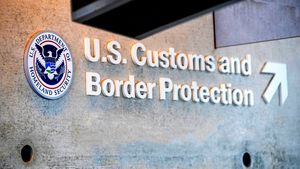Wednesday marked
President Barack Obama's first 100 days in office and, overall,
LGBT leaders are giving him high marks for laying a foundation
for achievement on a wide range of issues important to lesbian,
gay, bisexual, and transgender Americans.
"The big-picture
question is, if he promised change, has he delivered it? And I
think the answer is, 'Yes,'" said Gay and Lesbian Victory
Fund president Chuck Wolfe, articulating a sentiment shared by
many, with only a few caveats.
While some of the
big-ticket items like hate-crimes and employment
nondiscrimination legislation are still in process, since
taking office, President Obama's administration has joined the
United Nations statement condemning human rights violations
based on sexual orientation and gender identity, appointed John
Berry to the highest-ranking administration position ever held
by an openly gay person, and, perhaps most important, markedly
increased the community's access to the White House on any
number of fronts.
"I've been doing
Washington advocacy work since 1989, and this particular
administration feels not only more inviting or receptive of the
community but, quite frankly, more proactive," said Rea
Carey, executive director of the National Gay and Lesbian Task
Force.
One of the things LGBT
advocates stressed during the campaign, Carey noted, was that
they wanted the next president to not only listen to the
community but to also draw on its talents.
In that respect,
President Obama has already appointed at least 37 openly LGBT
people to Administration positions, setting him on course to
"far surpass" any previous president, noted Wolfe. A
document assembled
by LGBT activists who served in the Clinton administration
states that President Clinton "appointed more than 150 openly
gay and lesbian appointees" during his two terms in
office.
The White House has
also included LGBT people in key policy-making discussions on a
host of issues ranging from health care to the economy to tax
reform.
"We really are part
of a more broad-based conversation," said Human Rights
Campaign president Joe Solmonese, noting that he had the chance
to discuss the community's lack of access to Social Security
survivor benefits at the White House Fiscal Responsibility
Summit and LGBT barriers to health coverage at the White House
Health Reform Summit.
"To be able to talk
-- not just in the presence of the Administration, but of other
health care advocates -- about the taxes we pay on
domestic-partnership benefits, was incredibly important,"
Solmonese said, "because half the people in the room weren't
necessarily aware of some of the things we were talking
about."
The Administration also
got points for symbolic gestures like extending an invitation
to LGBT-led families at the annual White House Easter Egg
Roll.
"That was important
because it was about our families," said Alexander Robinson
of the National Black Justice Coalition. "We are often not
seen in the public eye as having families, so it was important
that the White House got it."
One area of concern for
some leaders included a mixed review of the Centers for Disease
Control's rollout of their
new AIDS action plan
, "9 1/2 minutes," earlier this month.
Though many were happy
to see an early emphasis on domestic HIV/AIDS policy, Robinson
noted that none of the 14 partner organizations listed by the
CDC to help address the disease in the African-American
community were LGBT organizations.
"The African-American
component included a number of African-American organizations,
but none of them have any real experience or expertise in
working with LGBT people, particularly not around an issue that
carries with it as much emotion and bias as something dealing
with sexuality," he said.
In order to have an
effect on the disease in the African-American community, he
added, "not only do we have to address the increase among
women, but we have to address the fact that gay men continue to
be the largest number of people living with AIDS and that, if
we look across the board, African-American gay men are infected
at a younger age -- we're talking mid to late teens and early
20s."
Carey of the Task Force
took issue with the
White House statement
following the Iowa supreme court's ruling on same-sex marriage
that restated President Obama's support for civil
unions.
"We talked to them
about if there was anything else that we could do to educate
those in the White House who may be writing statements on
issues concerning our community," she said.
But asked about the
lack of big accomplishments like passing a hate-crimes bill or
issuing certain executive orders, leaders mostly agreed that
Obama's first 100 days have paved the way for very significant
and consistent advances to come.
"I've been
impressed," said Solmonese. "Given all that this president
and this administration has encountered coming in -- the most
daunting economic crisis in a generation, the war in Iraq and
heightening situation in Afghanistan and the Middle East, and,
quite frankly, all they have had to undo from the Bush
administration -- I'm optimistic and inspired by the first
100 days."













































































